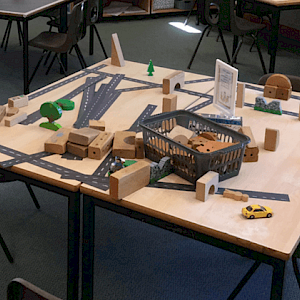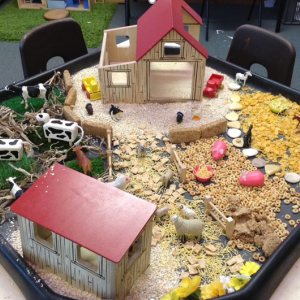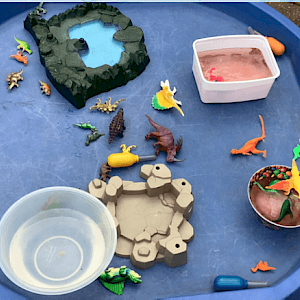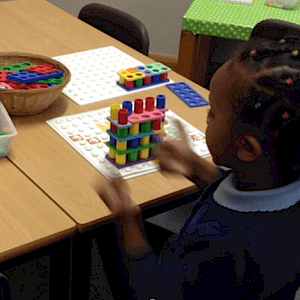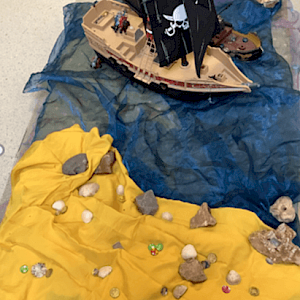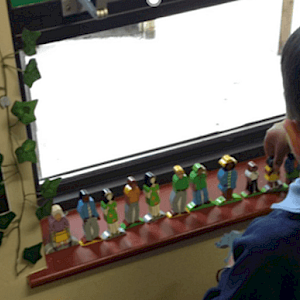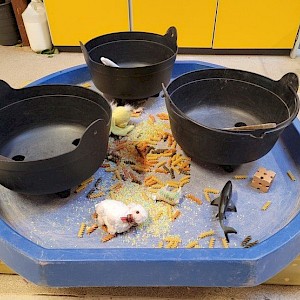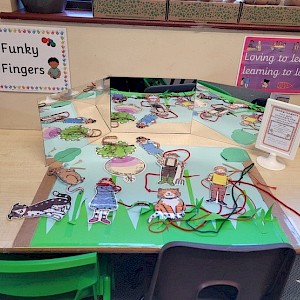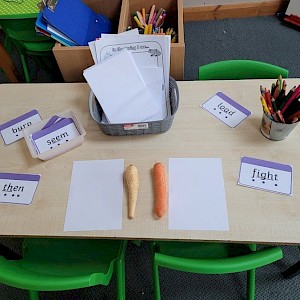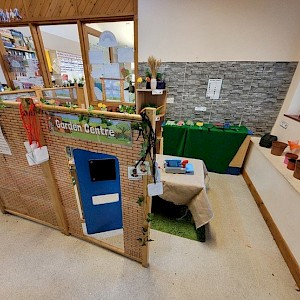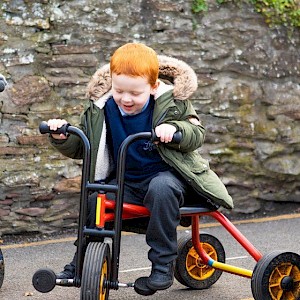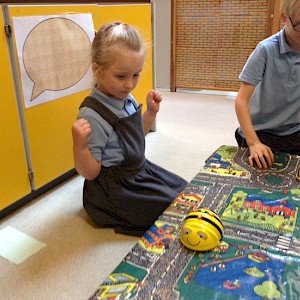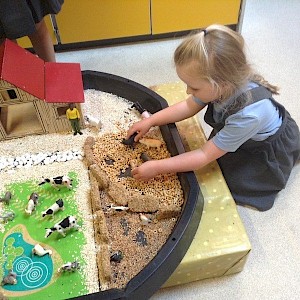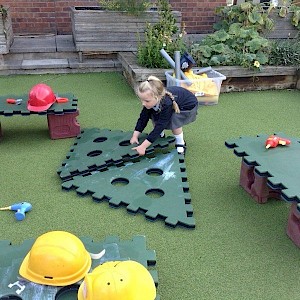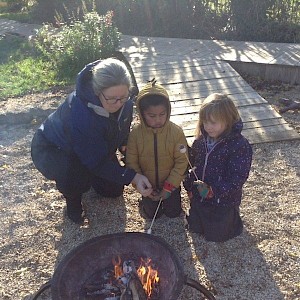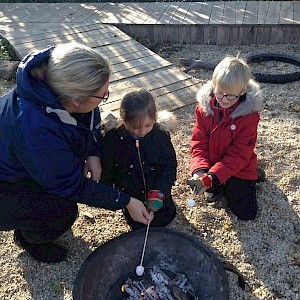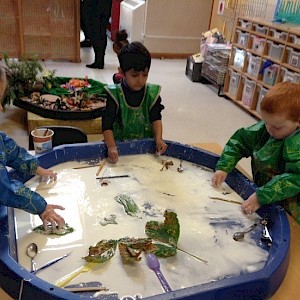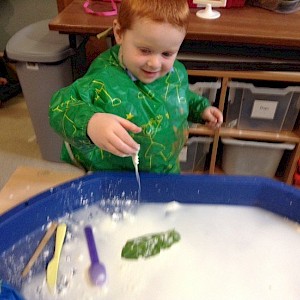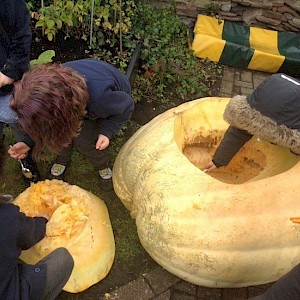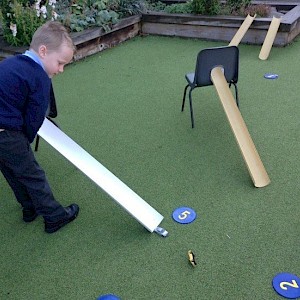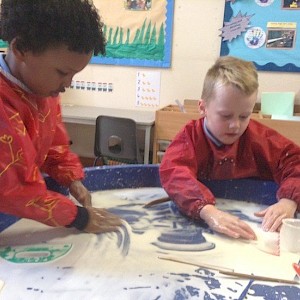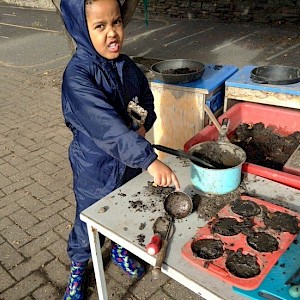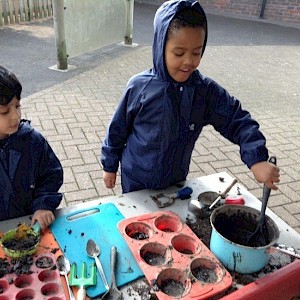Implementation
Our early years setting follows the curriculum as outlined in the 2021 statutory framework of the EYFS. ( from Sept 2021)
The EYFS framework includes 7 areas of learning and development that are equally important and inter-connected. However, 3 areas, known as the prime areas, are seen as particularly important for igniting curiosity and enthusiasm for learning and for building children’s capacity to learn, form relationships and thrive. Each of the 7 areas are broken up into strands.
The prime areas are:
- Personal, Social and Emotional Development: Making Relationships, Self-confidence and self-awareness, Managing feelings and behaviour, Looking after our bodies.
- Physical Development: Gross and fine motor skills,
- Communication and Language: Listening and Attention, Understanding, Speaking
The prime areas are strengthened and applied through 4 specific areas:
- Literacy: Reading, Writing
- Maths: Number, Shape, Space and Measures
- Understanding the World: People and Communities, The World, Technology
- Expressive Arts and Design: Exploring and using media
Characteristics of learning are outlines to support the children’s learning in each area of learning.
- Play and Exploring – Engagement
Finding out and exploring
Playing with what they know
Being willing to ‘have a go’
- Active Learning – Motivation
Being involved and concentrating
Keeping trying
Enjoying achieving what they set out to do
- Creating and Thinking Critically – Thinking
Having their own ideas
Making links
Choosing ways to do things
Our curriculum works to develop love and understanding of others regardless of differences.
We teach PSHE, British Values and SMSC to all children, regardless of their ability, culture, or beliefs. As a school we will actively challenge behaviours or beliefs which do not align with our policies. Our adopted PSHE scheme of work (Jigsaw) allows teachers to adapt and differentiate work where necessary. We found the rich use of visual resources throughout the scheme of work has been of great benefit to our children where English is an additional language. Additionally, the Jigsaw scheme allows for relevant issues around the world to be discussed. In a recent update to the Jigsaw scheme of work, there is now coverage of developing a positive mental health and resilience.
Our RE curriculum allows for all children to study the belief system of all the major faiths through ‘Discovery RE’ as well as deepen their understanding of Christianity through the scheme ‘Understanding Christianity’.
Through RE teaching, children learn about religious traditions and learn to reflect on what the religious ideas and concepts mean to them. Our teaching enables children to extend their own sense of values and promotes their spiritual growth and development. We use their experiences at religious festivals such as Harvest, Easter, etc. to develop their religious thinking. We organise visits to local places of worship and invite representatives of local religious groups to come into school and talk to the children.
The school day consists of a combination of carpet inputs, teaching groups, interventions and continuous provision. Our children have access to a balance of adult led learning and child led learning.
Adult led learning
Adult led learning takes the form of carpet time led by the class teacher. There are 4 sessions a day, that are focussed on teaching children specific skills linked to the curriculum, e.g. Phonics, Maths, circle time (personal, social, emotional development). These sessions are designed to be active to ensure children also develop their understanding of behaviours that are helpful for learning (e.g. resilience, collaboration, creativity, reflection, communication and taking risks). For further information on these “learning to learn” behaviours please visit (https://www.fishpondschurchacademy.bristol.sch.uk/our-learning/our-learning-1)
It can also take the form of focus tasks, which take place in small groups led by the class teacher. These tasks are designed to develop children’s English and Mathematics skills based on assessment and an analysis of children’s gaps to enable children to meet their next steps. For further information on assessment, please see the assessment section of this policy.
Child led learning
Child led learning takes the form of play, making use of the activities in the classroom, creative and outdoor areas. This is called continuous provision. Children have access to child led learning for 4 learning sessions a day.
Continuous Provision
At Fishponds Academy, our Early Years environments are zoned into the following areas:
Continuous Provision Areas
Outdoor
- Sand play
- Water play
- Physical play
- Large construction
- Deconstructed role play
- Stage – expressive arts
Indoor
- Creative Space – expressive arts
- Writing Zone
- Maths Zone
- Small World
- Home Corner
- Small Construction
- Fine and Gross Motor
- Reading Zone
- Story Zone
- Understanding the World – awe and wonder.
Planning for Continuous and Enhanced Provision
Staff plan activities and experiences for children that enable children to develop and learn effectively. In order to do this, practitioners working with the youngest children are expected to focus strongly on the 3 prime areas. Staff also take into account the individual needs, interests, and stage of development of each child in their care, and use this information to plan a challenging and enjoyable experience. Where a child may have a special educational need or disability, staff consider whether specialist support is required, linking with relevant services from other agencies, where appropriate.
All planning is underpinned by assessment to identify children’s strengths and gaps. Adults then use this information to structure their learning environments and activities to meet areas of need. Once these areas for development have been identified, the skills are then broken down into levels of development: emergent, middle and high. Provision must be challenging and have open-ended resources to always enable children to access learning at their own level. Activities will be organised in such a way that children will quickly develop skills over a period of weeks, (e.g. joining skills may begin with a child learning how to sue basic joins such as using glue moving towards mid-level joins, such as folding and taping and then progressing to high level joins such as hole punches, split pins etc.) Questions asked by adults will be planned in order to ensure every adult supporting children knows how to challenge children appropriately to enhance learning.
At Fishponds we recognise that historically our context children begin their Early Years experience with very low language skills. Therefore, we ensure language is at the heart of our planning to enable children to develop language skills and build a rich vocabulary.
Linked Provision
Continuous provision will be planned to support the application of skills learnt during adult led learning time, e.g. applying phonics skills by making labels in the construction area).
Early Years Environment
At Fishponds Academy, we recognise that the environment has the potential to have a significant impact on children’s learning, progress and engagement. Therefore, our learning environments must be fully focussed on the learning taking place, resources must be well organised, accessible and labelled with words and pictures. All areas of the environment must be well organised and tidy, clear of adult’s belongings in order to allow space for children’s learning. We believe this will encourage our children to respect and care for their learning environment and resources. The process of children’s learning should be celebrated in a way that is accessible to them. Displays should be calm and focussed, with all items displayed being for the purpose of boosting children’s self-esteem or allowing children to learn from them. All provision should be engaging and inviting, being monitored and adjustment according to children’s engagement and interests. Questions are a key tool used to moving children’s learning forward, so all activities will have a key question displayed so all adults can support learning accordingly. Adults use these questions to guiding children’s development through warm, positive interaction.
